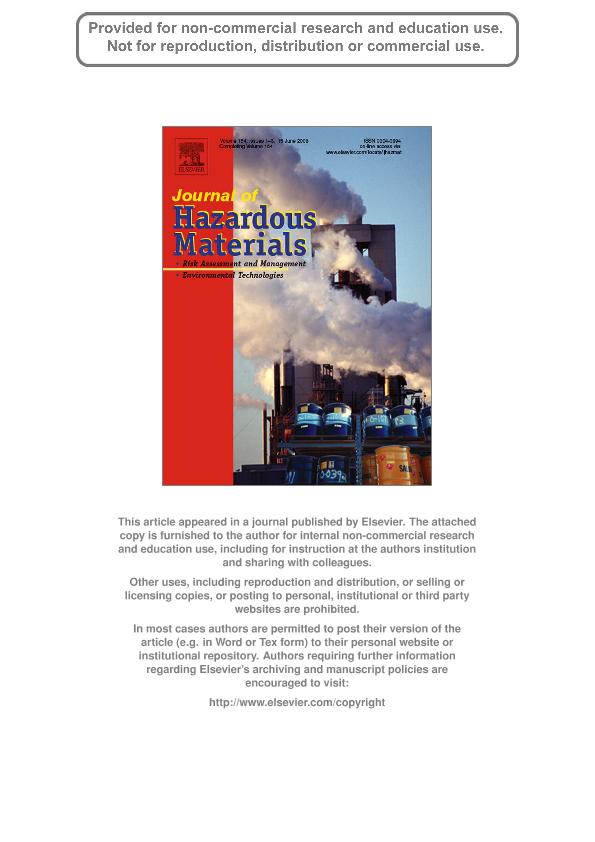Artículo
Biodegradation pattern of hydrocarbons from a fuel oil-type complex residue by an emulsifier-producing microbial consortium
Nievas El Makte, Marina Lucrecia ; Commendatore, Marta Graciela
; Commendatore, Marta Graciela ; Esteves, Jose Luis
; Esteves, Jose Luis ; Bucala, Veronica
; Bucala, Veronica
 ; Commendatore, Marta Graciela
; Commendatore, Marta Graciela ; Esteves, Jose Luis
; Esteves, Jose Luis ; Bucala, Veronica
; Bucala, Veronica
Fecha de publicación:
06/2008
Editorial:
Elsevier Science
Revista:
Journal of Hazardous Materials
ISSN:
0304-3894
Idioma:
Inglés
Tipo de recurso:
Artículo publicado
Clasificación temática:
Resumen
The biodegradation of a hazardous waste (bilge waste), a fuel oil-type complex residue from normal ship operations, was studied in a batch bioreactor using a microbial consortium in seawater medium. Experiments with initial concentrations of 0.18 and 0.53% (v/v) of bilge waste were carried out. In order to study the biodegradation kinetics, the mass of n-alkanes, resolved hydrocarbons and unresolved complex mixture (UCM) hydrocarbons were assessed by gas chromatography (GC). Emulsification was detected in both experiments, possibly linked to the n-alkanes depletion, with differences in emulsification start times and extents according to the initial hydrocarbon concentration. Both facts influenced the hydrocarbon biodegradation kinetics. A sequential biodegradation of n-alkanes and UMC was found for the higher hydrocarbon content. Being the former growth associated, while UCM biodegradation was a non-growing process showing enzymatic-type biodegradation kinetics. For the lower hydrocarbon concentration, simultaneous biodegradation of n-alkanes and UMC were found before emulsification. Nevertheless, certain UCM biodegradation was observed after the medium emulsification. According to the observed kinetics, three main types of hydrocarbons (n-alkanes, biodegradable UCM and recalcitrant UCM) were found adequate to represent the multicomponent substrate (bilge waste) for future modelling of the biodegradation process.
Palabras clave:
Bilge Waste
,
Biodegradation
,
Emulsification
,
Fuel Oil Residue
,
Ucm
Archivos asociados
Licencia
Identificadores
Colecciones
Articulos(CCT-CENPAT)
Articulos de CTRO.CIENTIFICO TECNOL.CONICET - CENPAT
Articulos de CTRO.CIENTIFICO TECNOL.CONICET - CENPAT
Articulos(PLAPIQUI)
Articulos de PLANTA PILOTO DE INGENIERIA QUIMICA (I)
Articulos de PLANTA PILOTO DE INGENIERIA QUIMICA (I)
Citación
Nievas El Makte, Marina Lucrecia; Commendatore, Marta Graciela; Esteves, Jose Luis; Bucala, Veronica; Biodegradation pattern of hydrocarbons from a fuel oil-type complex residue by an emulsifier-producing microbial consortium; Elsevier Science; Journal of Hazardous Materials; 154; 1-3; 6-2008; 96-104
Compartir
Altmétricas



